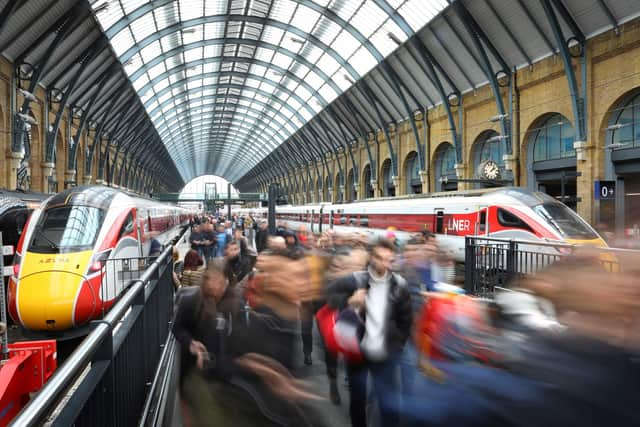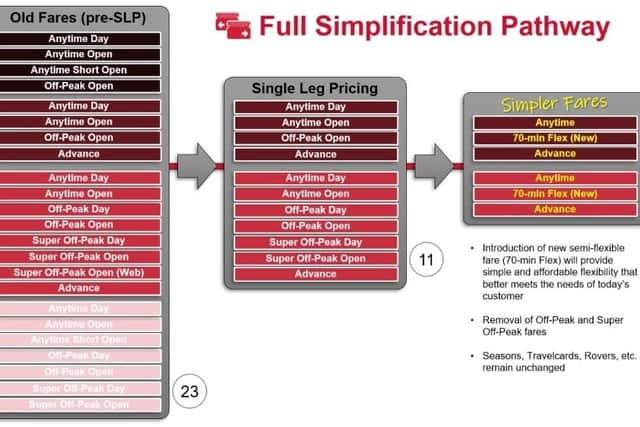Edinburgh-London train route: LNER cuts standard class fare types to three after would-be passengers deterred by complexity
A radically slimmed-down fare structure has been announced by the main Edinburgh-London train operator to encourage more people to rail travel, with just three types of standard class ticket available from February compared to 15 four years ago.
The move will also see London North Eastern Railway (LNER) increasingly price tickets like its airline rivals, which start low and go up as demand increases. The UK Government-run operator said the move showed it was “at the forefront of rail reform”.
Advertisement
Hide AdAdvertisement
Hide AdLNER’s new “Simpler Fares” pilot, devised with the agreement of UK ministers who are determined to make rail fares less complicated, could be followed by other England-based train operators such as other cross-Border firms.


It follows the company’s trial abolition of return tickets for some journeys in 2020, which was expanded across its network last year. Known as “single leg pricing”, it reduced the number of standard class ticket options from 15 to seven.
In this latest two-year stage, the reduced number of ticket options will be offered from today for journeys between Edinburgh, Berwick-upon-Tweed, Newcastle and London only from Monday, February 5. The number of first class ticket of options is being reduced from four to three.
Passenger watchdog Transport Focus described airline-style demand pricing as a “radical change”, but said it was too early to judge whether the change made things simpler. Another rail expert said it reduced flexibility.
The three standard class fares will include a new semi-flexible ticket known as “70 min Flex” that enables passengers to travel on LNER trains up to 70 minutes before or after their booked service. The ticket costs an extra £20. Edinburgh-London trains run every half an hour for much of the day.


The other tickets are “Advance”, which must be booked ahead and will be the lowest price, and “Anytime”, a fully flexible fare that can be used on any train.
Other parts of the LNER network, such as to Aberdeen and Inverness and other intermediate south of Edinburgh, will continue to offer the existing range of tickets: Advance, Anytime Day, Anytime Open, Off Peak Day, Off Peak Open, Super Off Peak Day and Super Off Peak Open.
Mark Smith, who runs the Man in Seat 61 rail website, tweeted: "Most of us had expected the three fares to be fully-flexible, semi-flexible & inflexible, in other words, Anytime, Off-Peak & Advance.
Advertisement
Hide AdAdvertisement
Hide Ad"Surprise! This new fares structure is Anytime, Advance and Advance, in other words fully-flexible, inflexible with a little flex, and inflexible.
"The existing Off-Peak fare is refundable, can be used on any operator and via any permitted route. It has a fixed price, so you always know what to expect even if you plan to buy on the day. Good for any off-peak train all day, can be bought on the day at that fixed, known price.
"It's being replaced from February with a new Advance fare that is non-refundable, LNER only, direct route only [and] dynamically priced … that represents a significant reduction in flexibility.”
Mr Smith said Edinburgh passengers could get round that by booking their tickets to/from Haymarket station in the Scottish capital instead, where Off-Peak fares will remain available.
Transport Focus chief executive Alex Robertson said: "The plan to trial demand-based pricing on some LNER routes is a radical change for passengers. We strongly support fares reform and it’s right to trial new ideas to see if they work. We will be monitoring that it does indeed deliver better value for money tickets.”
Rory Boland, editor of Which? Travel, said: "UK rail users face a confounding array of fares, so LNER's plan to offer a simplified pricing structure could be positive news for consumers, if the price is right. Off-peak and super off-peak fares are usually the best value, so it's essential that the new ticket types being trialled include equally affordable options."
UK transport secretary Mark Harper said last year a “customer first” culture must be instilled on the railways and fares were passengers’ biggest concern.
He said: “With 55 million fares available, how can anyone feel confident they’re getting the best value for money? Ticketing should be hassle free, something you barely have to think about.”
Advertisement
Hide AdAdvertisement
Hide AdLNER said 35 per cent of people considering rail travel were put off by the complexities of the fares system, referencing research from the Rail Delivery Group industry umbrella body. The operator said only 11 per cent of passengers bought Off-Peak and Super Off-Peak fares for the journeys on which they will be abolished, and its research found “most customers think the option to travel one hour earlier or later is about right and provides them with enough or more than enough flexibility”.
The operator argued demand-related pricing would help “smooth demand for services over the course of the day, all aimed at making rail travel even more attractive”.
LNER managing director David Horne said: “Simplifying fares is vital in making rail travel more attractive. Customers tell us they find fares confusing. This exciting new pilot is the next step in our plans to overhaul complicated and outdated ticketing options.
"We don’t cater that well for the times when people need a bit of flexibility, such as staying for another drink or more time after a meeting.”
UK rail minister Huw Merriman said: “We are delivering on our commitment to reform the railways, working with operators to provide passengers with simpler and more flexible tickets that better suit their needs.”
The Scottish Government said its own “Fair Fares” review, into the cost of public transport tickets, would be published “in the coming weeks”.
A Transport Scotland spokesperson said: “The review has reported its findings, recommendations and proposed actions internally. These are being carefully considered by ministers in the context of the Scottish Budget set out in December.”
Scottish Government-run ScotRail said its trial suspension of peak fares, which runs for nine months until June, had made its fares simpler.
Comments
Want to join the conversation? Please or to comment on this article.